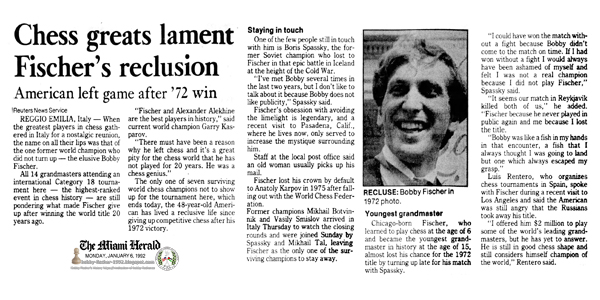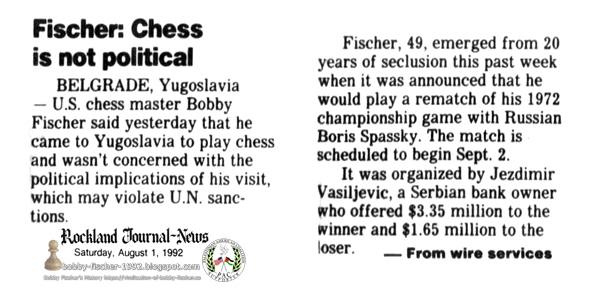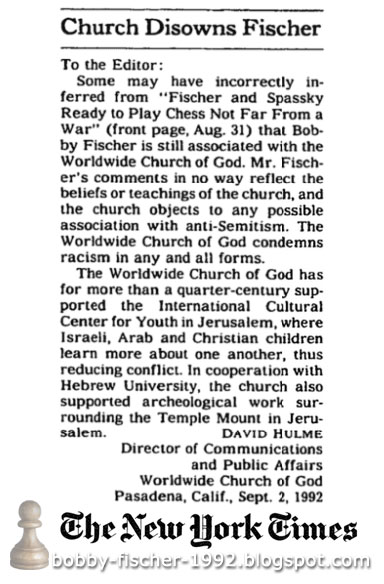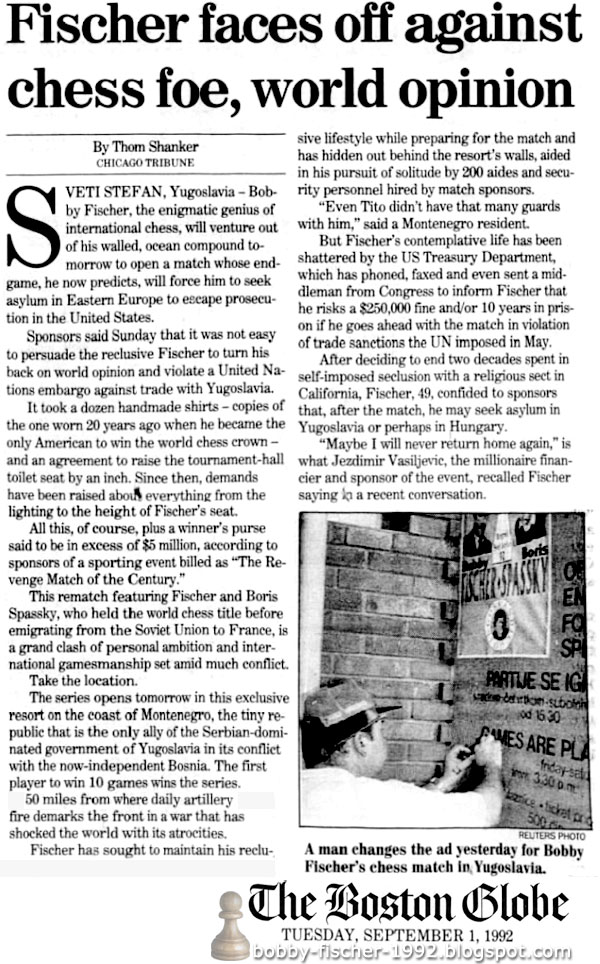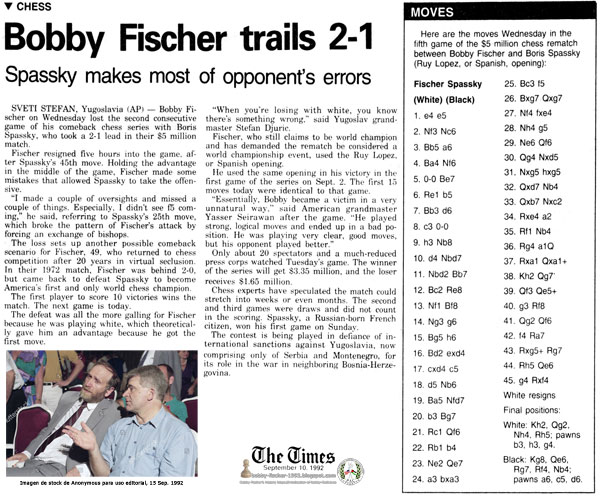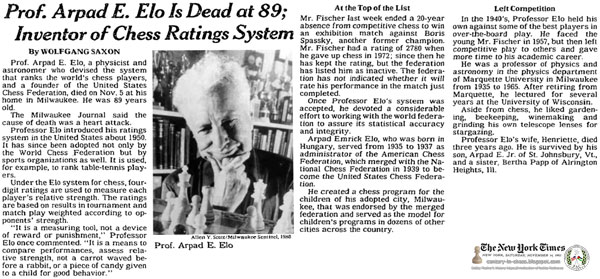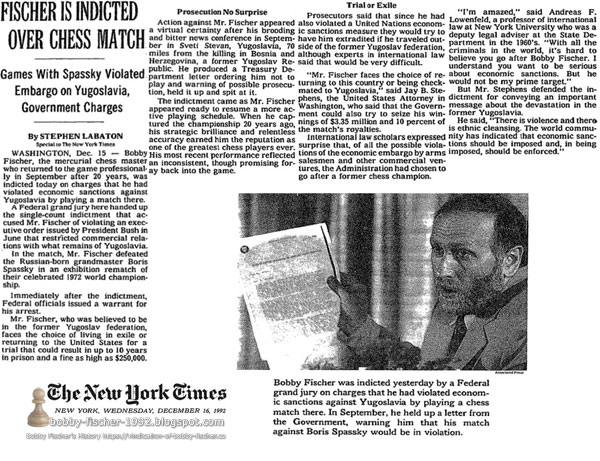The Miami Herald Miami, Florida Monday, January 06, 1992 - Page 86
Chess Greats Lament Fischer's Reclusion: American Left Game After '72 Win
Reuters News Service— Reggio Emiliar, Italy—When the greatest players in chess gathered in Italy for a nostalgic reunion, the name on all their lips was that of the one former world champion who did not turn up—the elusive Bobby Fischer.
All 14 grandmasters attending an international Category 18 tournament here—the highest-ranked event in chess history — are still pondering what made Fischer give up after winning the world title 20 years ago.
“Fischer and Alexander Alekhine are the best players in history,” said current world champion Garry Kasparov.
“There must have been a reason why he left chess and it's a great pity for the chess world that he has not played for 20 years. He was a chess genius.”
The only one of seven surviving chess champions not to show up for the tournament here, which ends today, the 48-year-old American has lived a reclusive life since giving up competitive chess after his 1972 victory.
Staying in Touch
One of the few people still in touch with him is Boris Spassky, the former Soviet champion who lost to Fischer in that epic battle in Iceland at the height of the Cold War.
“I've met Bobby several times in the last two years, but I don't like to talk about it because Bobby does not like publicity,” Spassky said.
Fischer's obsession with avoiding the limelight is legendary, and a recent visit to Pasadena, California where he lives now, only served to increase the mystique surrounding him.
Staff at the local post office said an old woman usually picks up his mail.
Fischer lost his crown by default in 1975 after falling out with the World Chess Federation ([after delegates allowed themselves to be unethically pressured to sway votes in Soviet favor]).
Former champions Mikhail Botvinnik and Vasily Smyslov arrived in Italy Thursday to watch the closing rounds and were joined Sunday by Spassky and Mikhail Tal, leaving Fischer as the only one of the surviving champions to stay away.
Youngest Grandmaster
Chicago-born Fischer, who learned to play chess at the age of 6 and became the youngest grandmaster in history at the age of 15, almost lost his chance for the 1972 title by turning up late for his match with Spassky.
“I could have won the match without a fight because Bobby didn't come to the match on time. If I had won without a fight I would always have been ashamed of myself and felt I was not a real champion because I did not play Fischer,” Spassky said.
“It seems our match in Reykjavik killed both of us,” he added.
“Fischer because he never played in public again and me because I lost the title.
“Bobby was like a fish in my hands in that encounter, a fish that I always thought I was going to land but one which always escaped my grasp.”
Luis Rentero, who organizes chess tournaments in Spain, spoke with Fischer during a recent visit to Los Angeles and said the American was still angry that the Russians took away his title.
“I offered him $2 million to play some of the world's leading grandmasters, but he has yet to answer. He is still in good chess shape and still considers himself champion of the world,” Rentero said.
The Valley Falls Vindicator Valley Falls, Kansas Thursday, January 09, 1992 - Page 1
Timetables
The Equal Rights Amendment was passed by the Senate 20 years ago and 22 states ratified the amendment in 1972. The few words prohibiting discrimination on the basis of gender failed to get approval from the required 38 states. Five men were arrested in June for their involvement in the burglary of Democratic Party headquarters in the Watergate apartment complex in Washington, D.C. The Watergate incident would end with the first resignation of a U.S. president. American Bobby Fischer won the world chess title from USSR's Boris Spassky; Jackie Robinson, the first Black to play major league baseball, died and the baseball season was delayed 13 days because of players' strikes over pension rights.
 Timetables 09 Jan 1992, Thu The Valley Falls Vindicator (Valley Falls, Kansas) Newspapers.com
Timetables 09 Jan 1992, Thu The Valley Falls Vindicator (Valley Falls, Kansas) Newspapers.com
The Miami Herald Miami, Florida Sunday, January 12, 1992 - Page 265
Dissolution of U.S.S.R. Shakes Up Chess World
Reuters News Service, London—The collapse of the Soviet empire may mean bleak times for the game of chess.
Many countries will be happy if fragmentation into separate republics makes it easier to challenge Moscow's long monopoly on world team and individual championships.
The Baltic States and Ukraine, for instance, have already applied for separate recognition at the Chess Olympiad in Manila in July, which suggests that the Russian team may be weaker than previous Soviet entries.
But loss of Soviet subsidies for chess, a feature of communist rule, may put the burden of funding the game at world level entirely on Western commercial sponsorship, players say.
With more Soviet players also likely to move to the West, the 1990s could see a glut of professionals chasing diminishing prize money.
Chess was long a shop window of Soviet achievement, seen by successive Kremlin rulers as marking the supremacy of communist culture ([the Nazis, or “National Socialists” used the sports arena as a vehicle to promote political propaganda; i.e., 1936 Berlin Olympics, in an attempt to prove the myth of Racial Superiority and promote Nazi political ideology]).
When Alexander Alekhine, a Russian, won the World Championship in 1927, it signalled an unprecedented era of dominance.
Since then only Max Euwe of the Netherlands (1935-37) and American Bobby Fischer (1972-75) have briefly managed to pry open the Soviet stranglehold.
The first USSR Championship was initiated in 1920 by Alexander Ilyin-Genevsy.
Working with Nikolai Krylenko, Commander-in-Chief of Russian forces after the October 1917 ([Undemocratic, not democratically elected, Soviet Bolshevik Coup, which is not the same thing as the Russian peasant revolt against the Imperialist Tsar, which began February-March 1917 establishing a legitimately democratic election of a Provisional Government for the Russian people “...established a liberal program of rights such as freedom of speech, equality before the law, and the right of unions to organize and strike. They opposed violent social revolution.”. The Bolsheviks, documented Imperial spies Vladimir Lenin, Leon Trotsky, Josef Stalin, on the contrary, destroyed the provisional government established by the people! See https://www.history.com/topics/russia/russian-revolution The Bolsheviks were not the “good guys” and led to the liquidation of millions of Socialists.]), Ilyin-Genevsky secured huge funding.
Chess was seen as possessing unique revolutionary credentials. It was not fatalistic and was deemed anti-religious. ([and also a great reflection of the corporate powers behind employment of the spies Lenin and Trotsky, to carry out politics like a “giant chess board of world politics” for the next century.])
The promotion of the game was a great success.
In 1923 the Soviet Union had 1,000 registered chess players. Within five years the number had grown to 140,000. There were four million registered players when the Soviet Union ceased to exist.
Josef Stalin once said: “Chess players should be in the front ranks of the fighters for the building of ([Bolshevik]) Socialism for technical mastery and for the rapid and successful fulfillment of the five-year plan.”
Mikhail Botvinnik, who captured the world crown in 1948 and whose lifetime spanned the period of Soviet chess hegemony, was quick to cable Stalin after an early international victory at Nottingham in England in 1936.
He told his “beloved teacher and leader” that “inspired by your slogan ‘catch up and surpass’, I am glad that I have been able to realize it.”
Botvinnik held the world title, except for two one-year interruptions, until 1963—through seven World Championships, all against Soviet opponents—before ceding it to fellow Soviet Tigran Petrosian.
He lost to Boris Spassky in 1969. Although Spassky lost to Fischer in 1972, the title defaulted to Soviet player Anatoly Karpov in 1975 when Fischer was unable to agree terms to defend it.
The current champion is Gary Kasparov.
He, too, has political friends but, in a sign of the changing times, was an early supporter of Russian President Boris Yeltsin.
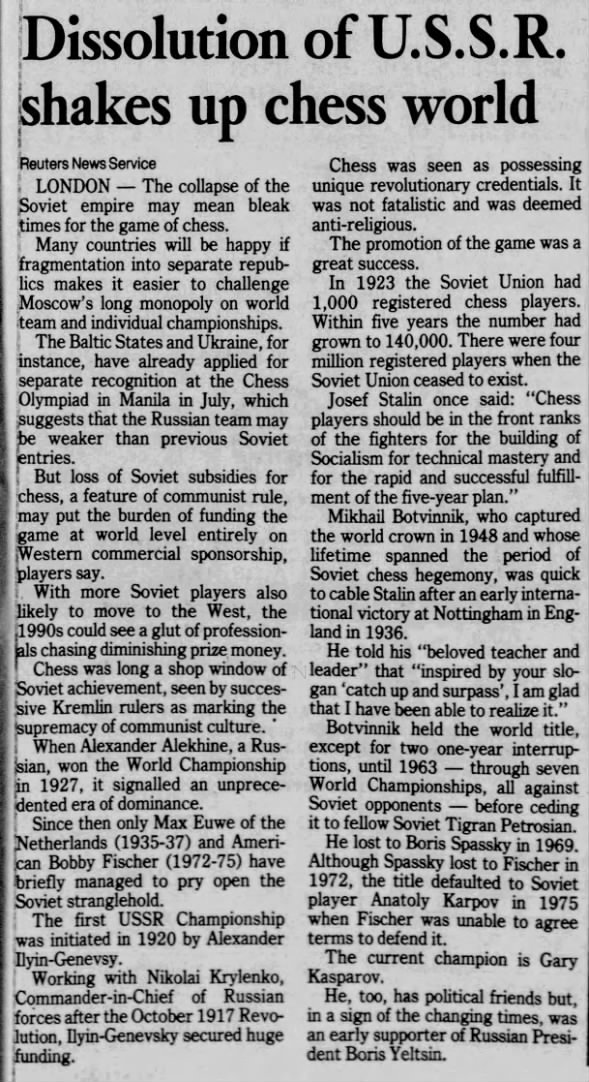 Dissolution of U.S.S.R. Shakes Up Chess World 12 Jan 1992, Sun The Miami Herald (Miami, Florida) Newspapers.com
Dissolution of U.S.S.R. Shakes Up Chess World 12 Jan 1992, Sun The Miami Herald (Miami, Florida) Newspapers.com
The Wichita Eagle Wichita, Kansas Friday, July 31, 1992 - Page 8
Chess Anyone? Fischer, Spassky but not as in 1972
Remember 1972? Richard Nixon was re-elected president. Philippines President Ferdinand Marcos declared martial law and assumed nearly dictatorial powers. A. Managua, Nicaragua, earthquake killed 10,000. Alabama Gov. George Wallace was shot by would-be assassin Arthur Bremer. District of Columbia police arrested five men inside Democratic National Headquarters in the Watergate complex. The United States resumed bombing of North Vietnam. Tropical storm Agnes hit the eastern United States and created what the U.S. Army Corps of Engineers called the worst natural disaster in U.S. History.
And Bobby Fischer beat Boris Spassky for the world chess championship.
It wasn't the biggest event that year. The outcome didn't change the course of history. But it sparked enough interest that the media covered it extensively and school kids wanted to learn how to play the game. Bobby Fischer became a kind of cult hero as Americans with anti-Soviet fervor rooted for the reclusive and socially strange ([Autism Spectrum… now who's being intolerant?]) enfant terrible of world chess.
Now the word comes that there will be yet another Fischer-Spassky match. It's been 20 years since Mr. Fischer became the first American chess champion of the world. Seems appropriate somehow that it would take that long for another match. Chess is, after all, a contemplative game. It doesn't move quickly.
Even in the midst of numerous critical issues in 1972, Americans who couldn't tell a checkmate from a stalemate followed their young chess genius to victory over Soviet Communism. But since Mr. Spassky is no longer part of an evil empire, it is doubtful this nation will get as enthused about this match as it did when beating the Russians at anything was utmost.
To those who don't remember 1972, that may seem pretty silly. To those who do, Bobby Fischer still seems heroic. ([Why shouldn't he? He's counted as likely the greatest in history, and he is American-made.])
The Journal News White Plains, New York Saturday, August 01, 1992 - Page 3
Fischer: Chess Is Not Political
Belgrade, Yugoslavia—U.S. chess master Bobby Fischer said yesterday that he came to Yugoslavia to play chess and wasn't concerned with the political implications of his visit, which may violate U.N. sanctions.
Fischer, 49, emerged from 20 years of seclusion this past week when it was announced that he would play a rematch of his 1972 championship game with Russian Boris Spassky. The match is scheduled to begin Sept. 2.
It was organized by Jezdimir Vasiljevic, a Serbian bank owner who offered $3.35 million to the winner and $1.65 million to the loser. —From Wire Services.
Honolulu Star-Bulletin Honolulu, Hawaii Saturday, August 01, 1992 - Page 5
Fischer In Yugoslavia For Chess
AP. Belgrade, Yugoslavia—U.S. chess master Bobby Fischer has been in seclusion for 20 years and now that he's ready to play Boris Spassky, he says the United Nations isn't going to stop him.
Fischer, 49, said yesterday that he wasn't concerned about the political implications of the chess match in Yugoslavia, which is under U.N. sanctions for its role in the Bosnia-Herzegovina fighting.
It was announced this week that Fischer would play a rematch of his 1972 championship game with Russian Boris Spassky. The match is scheduled to begin Sept. 2.
It was organized by Jesdimir Vasiljevic, a Serbian bank owner who offered $3.35 million to the winner and $1.65 million to the loser. Fischer was interviewed by Vasiljevic on Yugoslav television.
When asked if playing the match in a country under sanctions was a political event, Fischer said: “I don't know much about that. I came here to play chess and that's what interests me.”
Vasiljevic asked Fischer if audiences could count on the match taking place as planned.
“Sure, if Spassky comes here,” Fischer replied.
The U.S. government has had no comment on the competition.
Vasiljevic was quoted as saying he orchestrated the event as an “open war” on U.N. sanctions against Yugoslavia.
On May 29, U.N. sanctions prohibiting most trade and sports contact with Yugoslavia were imposed to punish the government for its role in the war in Bosnia, formerly part of Yugoslavia.
Now we know “Jesdimir Vasiljevic,” was willing to throw ([Complex-PTSD, Autism Spectrum]) Bobby Fischer under the bus, to do the time, alone, for Vasiljevic's personal capitalist dispute with the overreaching tentacles of the Imperial U.S. Behemoth.
Chicago Tribune Chicago, Illinois Sunday, August 02, 1992 - Page 58
Deja Vu in '92
In sports, we've seen famous comeback attempts, but perhaps nothing quite like what Bobby Fischer proposes.
Those older than 35 surely recall the national mania of 1972 when, at the depths of the Cold War, Fischer toppled Russia's Boris Spassky in Reykjavik, Iceland, to become the first American to win the world chess championship.
Even those who, like myself, knew zilch about chess were captivated. When New York's public-TV station switched from one evening's account to the Democratic National Convention (the one that picked Eagleton), it was flooded with calls from irate listeners and soon returned to chess.
Last week came word that Fischer and Spassky have apparently agreed to play a $5 million exhibition in September, that would start on a Yugoslav island and conclude in Belgrade. A Belgrade banker is the moneybags behind the event.
Fischer, 49, is a bachelor said to live in South Pasadena, Calif. You can never be sure.
Even the insular world of chess knows little about his doings. When word spread about the exhibition, everybody was stunned, including one-time Fischer chums such as grandmaster Robert Byrne.
“We never expected this,” said Byrne, chess writer for The New York Times and a quarter-finalist at the 1974 world championship. “I've been given lots of explanations as to why but don't believe any of them. Even if he shows up and begins the match, will he really finish?” ([Ah! Like when antisemitic organizers trampled Fischer's reverence at Tunisia, forcing the ultimatum to break his Sabbath, or forfeit, while he was in the lead? Sure he walked out. Just as many Sunday-keepers refused to accept jobs when required to break what they call the “Lord's Day”. Or when Referee Irving Rivise, gave Fischer the ultimatum of forfeit, or be willing to start his match with Reshevsky at 11 a.m. Never once did organizers get Fischer's permission to change the starting time. The time was changed to suit Rivise's own personal schedule, which had him driving to San Francisco to the U.S. Open the following day. Yes… Fischer refused to cave to organizer extortion tactics, and good for him standing up to establishment bullies!])
Meanwhile, the sport's upper echelons came to revere his talent but scorn his taking the game to an unprecedented height and then quitting without defending the crown. ([Well, they should take a step back, look in the mirror, and observe the horrible things they've uttered, put in print and through a flood of vicious defamation of Mr. Fischer, destroyed what little remained of Fischer's interests to work, and bolster public interest in petty backbiters who have nothing better to do than spread common slander.])
There may be self-interest underlying the chagrin. His departure meant the game returned to its virtual anonymity, leaving fewer financial opportunities for those who remained. ([Yep. Don't know what they had till it was gone… and what about that lawsuit against Brad Darrach's army of lawyers. How the chess world gleefully waved that book around as if it were factual “gospel” vs. what it really was: criminal libel and defamation. Who cares about facts? Fischer did, that's who. They got exactly what they deserved when Fischer gave them 20 years cold shoulder treatment. When Fischer was repelled by Frank Brady's fiction… who cared to hear Fischer's side of the story? When Fischer was repelled by Larry Evan's grasping for his own fame and glory… who sought out Fischer to tell his side of the story? No… they loved their gossip, defamation and slander for their own personal profiting off Fischer's back, much more than a boring, truthful account. So they bellyache that Fischer abandoned chess? Did anyone shed a tear that Fischer was robbed of his prize money by unscrupulous lawyers, or that people were smearing his character in the public press? No? Of course not.])
But what really is the deal with Fischer?
More relevant, can one lay off top competition for 20 years and return without embarrassing yourself?
“For anybody else, I'd say it's ridiculous,” Byrne said. “With Fischer? I don't know. He was that good.
“He's probably the greatest genius the game has ever had. I've heard third-hand reports that he studies the latest chess openings, so I'd bet he's up on the latest stuff.”
Byrne said he called Spassky, who's “as honest as the day is long” and lives in Paris, to get his reaction last week. The reaction?
“We just laughed,” Byrne said.
“We really used up most of our time laughing.”
“Boris can't believe this might actually happen.”
Caption: Former World Chess Champion Bobby Fischer is proposing what may be the most difficult comeback attempt ever.
 Deja Vu in '92 02 Aug 1992, Sun Chicago Tribune (Chicago, Illinois) Newspapers.com
Deja Vu in '92 02 Aug 1992, Sun Chicago Tribune (Chicago, Illinois) Newspapers.com
The Observer London, Greater London, England Sunday, August 02, 1992 - Page 18
Surprise Gambit of A Grandmaster
Bobby Fischer, undefeated former world chess champion, plans a return match with Boris Spassky, his opponent of 20 years ago. Julie Flint looks at the prospects.
MOST thought it impossible, as likely as squaring the circle. But it looks as if they all were wrong. Bobby Fischer is coming out of the shadows to which he consigned himself 20 years ago for a $5.5 million rematch with Boris Spassky, in 1972, the year Angela Davis was acquitted and the Duke of Windsor died, to become America's first world chess champion.
Who will we be seeing? Says Yugoslav grand master Svetozar Gligoric, who has been with Fischer on the Yugoslav resort island of Sveti Stefan. ‘He is in a better mood than he was in Iceland — more pleasant, more relaxed. He looks fine. And he is playing very, very strongly.’
Gliga, the bon viveur who has always defended the chess world's enfant terrible, discovered that to his cost last week when he played a dozen games against Fischer. He earned himself one draw — but no wins and a whole heap of defeats.
Refereeing the match next month will be Lothar Schmid, the German grandmaster through 21 world championship games in 1972 is ready to do it again. Why? Because, he says, even after 18 match-less years, Fischer was able to spot what no one else could; the refutations of the queen sacrifice with which Garry Kasparov defeated Anatoly Karpov in their fifth world championship game. ‘I know he is difficult. He has a lot of trouble with himself and other people. But he is honest. This match will be an outstanding event.’
Gligoric believes Fischer has emerged from his troubled retirement because this match finally meets his terms — his rules, his chess clock, his conditions of play. Schmid has another explanation. ‘Bobby needs some money.’
Wrong. Since defeating Spassky, Fischer has turned down offers worth millions and lived like a recluse.
Yugoslavia was where it all began — where Fischer began his international career and where he wanted to meet Spassky in 1972 ([Actually, Fischer had his eye on Argentina, and other western locations where telecommunications were readily available to legally broadcast the matches, but the Soviet, so accustomed to government censorship would have none of that, and extorted officials into isolating the match within Iceland, to bury the match.]) Not only because it was not the Soviet Union — but because it offered the biggest purse: $152,000 ([Wrong. Australia offered the biggest: $200,000 + $25,000 for organizational expenses.])
Max Euwe, president of the International Chess Federation, split the championship between Reykjavik, Spassky's choice, and Belgrade, Fischer's choice. ([Because the Soviet Union resist any nation outside Europe!! against Fischer's will.]) Fischer agreed, but changed his mind. ([Oh yes, when “old hands” began plotting against Fischer, to disqualify him, and demanded an illegal $25,000 guarantee, which, naturally, the U.S. Chess Federation refused to pay]). Belgrade withdrew its bid. Euwe gave all the games to Reykjavik ([after Euwe reneged on his promise to nations around the world, “first come, first serve bids” — with Australia and Mexico stepping up to the plate with large, never before heard of prize bids far outdoing anything coming from the European locales! But the Soviet Union, in one of its many tantrums began threatening to withdraw Spassky from play, as they always had done to get their own selfish, unsportsmanlike way.]) Fischer submitted ‘under protest’, ([rightfully upset]) that the Russians ‘know they're going to lose the match, so they figure they may as well bury it.’ ([As Fischer correctly put it, Iceland was the one place on earth it was impossible to access modern satellite communications, and hence achieve censoring coverage. Not only that, but Iceland was notoriously racist and Anti-American, which would work wonders for Soviets provoking real life security and safety risks to the American challenger and his entourage which included Fischer's good friend, as self-reported, the only African American in attendance at the tournament, or anywhere near the sports hall, Archie Waters.])
Fischer then ‘disappeared’. As Spassky tried to keep his head while all around lost theirs, the word came from New York: a cut of the gate or no match. Euwe postponed the first game for 48 hours. Jim Slater doubled the purse. Fischer cried: ‘I gotta accept. It's stupendous.’
He arrived in Iceland on the morning of 4 July but slept through the drawing of lots. A news conference was called. Bobby was missing. Moscow demanded written apologies ([to use in its state propaganda]). Euwe left Iceland. Bobby apologized ([to satiate Soviet tantrums and get the match under way in spite of their juvenile antics]).
On 11 July, the show got on the road 10 days behind schedule. But a show, for a good while yet, it was doomed to be. Fischer lost the first game with an elementary blunder ([due to disruptive camera men placed there to interrupt his concentration]) after discovering that the television cameras he had reluctantly accepted were not unseen and unheard, ‘like candid camera’, but towered behind the players' chairs.
He boycotted the second match and Schmid awarded the point to Spassky. Fischer protested. Schmid, in extremis, allowed the next match to be played in a private room without cameras. Chester Fox, the young New Yorker with the film rights, sued ([thanks to a hidden agreement the Soviets/Icelandic Chess Federation made with Chester Fox, its details hidden from Fischer]) and the championship resumed — buffeted by a stream of protests from Fischer over noise.
And it was noisy. Because Reykjavik had no tournament hall, a sports stadium had been converted for the championship. Fold-up benches clacked. Corrugated iron walls twanged. Kids scrunched sweet papers. Adults yakked. It wasn't ideal for Spassky, who liked crowds; it was hell for Fischer, who didn't.
Midway through the match, Fischer complained of snoring. Schmid tiptoed down to catch the sleeper in flagrante, but failed. Rattled at last, Spassky fell steadily behind until, in the 17th game, the Russians accused the Americans of using chemical and electronic aids ‘to unbalance Mr. B. Spassky and make him lose his fighting spirit.’ ([In 1985, Spassky confirmed that job was done by Moscow.]) This was surely not poor Spassky's doing. He, better than anyone, knew that the Americans needed no such aids: they had the dream aid — Fischer.
The match of the century degenerated into farce as scientists crawled around the stage with microscopes and X-ray machines. They found two dead flies and Fischer asked if there would be an autopsy. The championship resumed. Spassky rallied, but could not win.
Since then, Fischer has lived in seclusion in ([the college campus apartments of a Pasadena-based Christian cult's headquarters]) that happily hoovered up his winnings, refusing to defend his title under existing rules but making regular outings to the Los Angeles library to study every tournament played. He fell out with the church and was arrested on suspicion of being a bank robber.
Bank robber he was not. He later published a pamphlet: ‘I Was Tortured In The Pasadena Jailhouse’. It sold for $1. If you loved him, read it. ([…to educate the public about the causes of Complex-PTSD; cult survivor and exploitation, police brutality; et cetera.])
Fischer spent much of 1990 in Europe, marketing his clock (which rewards players for thinking quickly in the opening game). Schmid found him unchanged — still convinced that spies follow him everywhere ([the Soviet did spy on people, worldwide… on occasion, for their propaganda machine, unleashing nasty articles with layers of falsities wrapped around a scrap or two of dubious “facts”. So, why shouldn't Fischer be different than any other targeted by the Soviet Union for smear campaigns?]) Still ‘very kind, very friendly’, still happy, in his fashion, until journalists get to him. But the crusader of 1972 is now 49, long on analysis and short on games. Spassky, four years his senior, plays unambitiously, content with draws. Can the clock be turned back? Should it be?
But Fischer-Spassky it's going to be, with players at one end of the dining room of a luxury hotel, spectators at the other and the journalists Fischer ([avoids]), in the casino. Perhaps the bad boy from Brooklyn is wising up.
The Tampa Tribune Tampa, Florida Tuesday, August 04, 1992 - Page 42
Reclusive Celeb Turns Emergence Into Prize Gambit
He didn't look quite the same as he did 20 years ago, but then again, with the exception of Dick Clark, who does?
But there he was, former grand chess master Bobby Fischer, a recluse who makes J.D. Saligner seem like a party animal, out in the open again.
It was as odd an announcement as most of what has passed for Bobby Fischer's public life: Two decades after the brash New Yorker had defeated Russian Boris Spassky to become the world chess champion, the two old foes would once more meet to play a $5 million rematch next month in, of all paces, war-torn Yugoslavia, or what's left of it.
Just why anyone would pick Yugoslavia right now as the site of a game requiring intense quiet and concentration is beyond me. Apparently Bobby Fischer, who makes Greta Garbo look like a politician on the stump, hasn't been reading the papers much since 1972, either. He probably thinks Tito is still in power.
Twenty years ago, the 29-year-old John Cassavettes look-alike made his way to the international chess title over the urbane Spassky in a lengthy series of matches that sparked a greater American interest in the game.
It should have been a time of celebrity, glory, and of course, cashing in on his fame for Fischer, who instead went into a deep-chill seclusion, rarely to be seen or heard from since. ([He found himself secluded behind the guarded gates of the Worldwide Church of God's college campus apartments, having his prize winnings pilfered by the cult's lawyer, Stanley Rader. Figure it out.])
Which obviously begs the question: What does Bobby Fischer do all day long?
Thanks to “Entertainment Tonight” and Barbara Walters, there are celebrities whose daily lives are as exposed as the Energizer bunny.
Even personalities who claim to crave privacy make their pleas in the pages of People magazine, complete with photograph after photograph of everything from their bedroom to the workbench in the garage.
Checkmate Redux
Not so Bobby Fischer, who just dropped out of sight, except for a brief flurry of activity in the mid-1970s when he toyed with a possible comeback that never materialized. ([Just as Viktor Yushchenko was making his “comeback” when he found himself on the receiving end of the KGB's little “gifts” that keep giving.])
What does a former world chess champion do all day long for 20 years! After all, you can only go around muttering “queen to rook four” so much.
We all have to do something from the time we get up to the time we go to bed. Don't we?
There's no indication that Fischer went out and found himself a job. Besides, it would be hard to imagine the dark, introspective Bobby Fischer hawking whole-life insurance or running a yogurt stand on Clearwater Beach.
Across the panoply of celebrity, there are a number of people who cannot be imagined as having any semblance of a “normal” life apart from whatever it is they are famous for doing.
But we do know this much. We know what Bobby Fischer will be doing for a few weeks beginning next month: playing chess with Boris Spassky for $3.5 million to the winner, $1.6 million to the loser.
Now that's not a bad day job.
 Reclusive Celeb Turns Emergence Into Prize Gambit 04 Aug 1992, Tue The Tampa Tribune (Tampa, Florida) Newspapers.com
Reclusive Celeb Turns Emergence Into Prize Gambit 04 Aug 1992, Tue The Tampa Tribune (Tampa, Florida) Newspapers.com
The Los Angeles Times Los Angeles, California Tuesday, August 04, 1992 - Page 93
Pawns In A Game
At a distance from events in Bosnia-Herzegovina, one might possibly view the horrific campaigns of “ethnic cleansing,” which aim to leave only one set of players still standing, as unfolding with deadly deliberation in accord with grand strategy. It could all be likened to a crazed game of chess. So maybe it should come as no surprise that U.S. chess whiz Bobby Fischer has agreed to a rematch, 20 years later, with Russian Boris Spassky on a Montenegrin island and in Belgrade, Serbia's and shrunken Yugoslavia's capital, where the two old foes are to play for a $5-million purse. The famously capricious Fischer, asked in Belgrade whether playing the match in a country under sanctions will be a political event, answered: “I don't know much about that. I came here to play chess, and that's what interests me.” As reports emerged of Serb-organized concentration camps where more than 1,000 Muslim Slav and Croat prisoners may have been killed, and as daily life brought such touches as the machine-gunning of a bus carrying orphans, it was clear that for thousands of suffering Bosnians the political element was something it could be worth their lives to be ignorant of.
 Pawns in a Game 04 Aug 1992, Tue The Los Angeles Times (Los Angeles, California) Newspapers.com
Pawns in a Game 04 Aug 1992, Tue The Los Angeles Times (Los Angeles, California) Newspapers.com
Newsday (Nassau Edition) Hempstead, New York Wednesday, August 05, 1992 - Page 8
Bobby Fischer and Boris Spassky: It's Their Move
It is 20 years since Bobby Fischer became America's only world chess champion by defeating Boris Spassky of the then-Soviet Union.
The reclusive Fischer forfeited the title by refusing to defend it, but it was reported recently that he will play Spassky once again, and now comes word that the event will be a $5 million rematch set in Yugoslavia.
The Associated Press, citing news reports, said that Fischer initially will play Spassky on Sveti Stefan, a Montenegrin island, starting Sept. 2. Spassky and Fischer later will move to Belgrade to finish the nine matches, the reports said.
The winner of the match is to receive $3.35 million and the loser $1.65 million, said an aide to the organizers, Belgrade banker Jezdimir Vasiljevic. Vasiljevic has leased much of Sveti Stefan from the Montenegrin government.
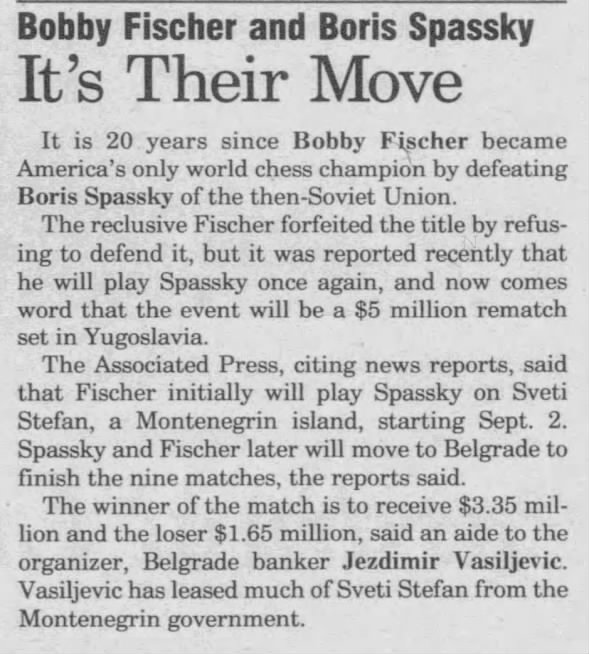 Bobby Fischer and Boris Spassky: It's Their Move 05 Aug 1992, Wed Newsday (Suffolk Edition) (Melville, New York) Newspapers.com
Bobby Fischer and Boris Spassky: It's Their Move 05 Aug 1992, Wed Newsday (Suffolk Edition) (Melville, New York) Newspapers.com
Fort Worth Star-Telegram Fort Worth, Texas Thursday, August 06, 1992 - Page 20
Spassky, Fischer in Yugoslavia to Play Chess
Belgrade (AP) — Russian chess grand master Boris Spassky has arrived in Yugoslavia for a $5 million match that has brought American Bobby Fischer out of seclusion, organizers said today.
The two former world champions met late yesterday after Spassky's arrival for an informal dinner in Belgrade, and organizers of the match said they “made a couple of moves” at the table.
Fischer beat Spassky in 1972 to take the world title, but later forfeited the championship by declining to defend it. He has not played in public since.
The rematch, which might violate U.N. sanctions on Yugoslavia, was organized by Jezdimir Vasiljevic, the owner of one of Yugoslavia's largest private banks. He has offered $3.35 million to the winner and $1.65 million to the loser.
The nine-game Fischer-Spassky match is scheduled to start Sept 2 in Sveti Stefan, a resort on the Montenegrin Adriatic coast.
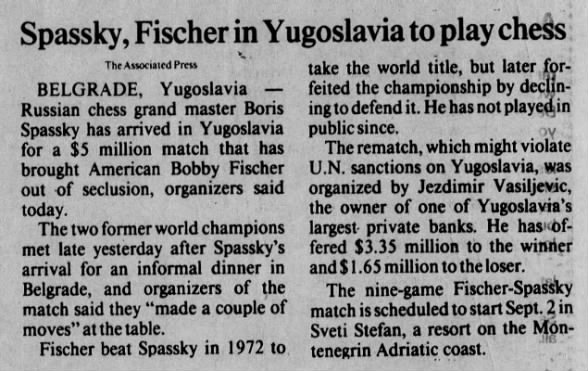 Spassky, Fischer in Yugoslavia to Play Chess 06 Aug 1992, Thu Fort Worth Star-Telegram (Fort Worth, Texas) Newspapers.com
Spassky, Fischer in Yugoslavia to Play Chess 06 Aug 1992, Thu Fort Worth Star-Telegram (Fort Worth, Texas) Newspapers.com
St. Louis Post-Dispatch St. Louis, Missouri Friday, August 07, 1992 - Page 4
Fischer, Spassky Ready For Rematch
Belgrade, Yugoslavia (AP) — Boris Spassky, the Russian chess grandmaster, has arrived in Yugoslavia for a $5 million match with American Bobby Fischer, who has come out of seclusion, organizers said Thursday.
The two former world champions met late Wednesday after Spassky's arrival for an informal dinner.
Fischer beat Spassky in 1972 to take the world title but later forfeited the title by refusing to defend it. He has not played in public since.
The rematch has been organized by Jezdimir Vasiljevic, the owner of one of Yugoslavia's largest private banks. He has offered $3.35 million to the winner and $1.65 million to the loser.
The nine-game Fischer-Spassky match is scheduled to start Sept. 2 in Sveti Stefan, a resort on the Montenegrin Adriatic coast. The players will later move to Belgrade, the Yugoslav and Serbian capital.
Montenegro and Serbia are the only two remaining republics in Yugoslavia. The U.N. Security Council imposed strict sanctions on Yugoslavia to punish the Serb-dominated federation for fomenting war in neighboring Bosnia-Herzegovina.
The United States has strictly observed the sanctions, which bar commercial and sports links with Yugoslavia. Fischer is an American citizen, and he might be violating the sanctions by playing the match. Fischer refused to speak to reporters after his arrival in Yugoslavia.
Belgrade media said that Fischer has been training for the match by analyzing chess games, weight lifting, swimming and jogging. They said that both Spassky and Fischer appear physically fit and in good moods.
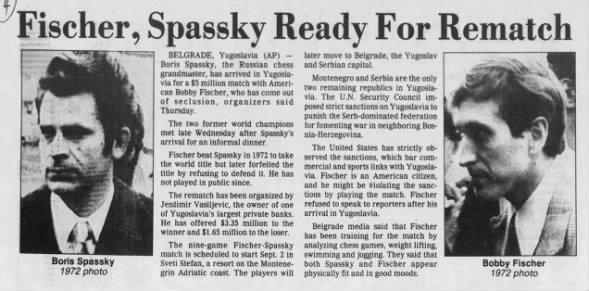 Fischer, Spassky Ready For Rematch 07 Aug 1992, Fri St. Louis Post-Dispatch (St. Louis, Missouri) Newspapers.com
Fischer, Spassky Ready For Rematch 07 Aug 1992, Fri St. Louis Post-Dispatch (St. Louis, Missouri) Newspapers.com
Elko Daily Free Press Elko, Nevada Friday, August 07, 1992 - Page 2
Robert Fischer, Legendary Chess Icon 'Superstar'
“You see the distinction I'm trying to make. The news that Bobby Fischer is coming out of seclusion to play chess again interests even people who don't play chess or know who the current champion is. It was reported in the news section, not the chess or sports section, of the New York Times. Bobby Fischer is a symbol of chess to the general public in the same way Babe Ruth was a symbol of baseball. Twenty years after his abrupt retirement he is chess's only superstar.
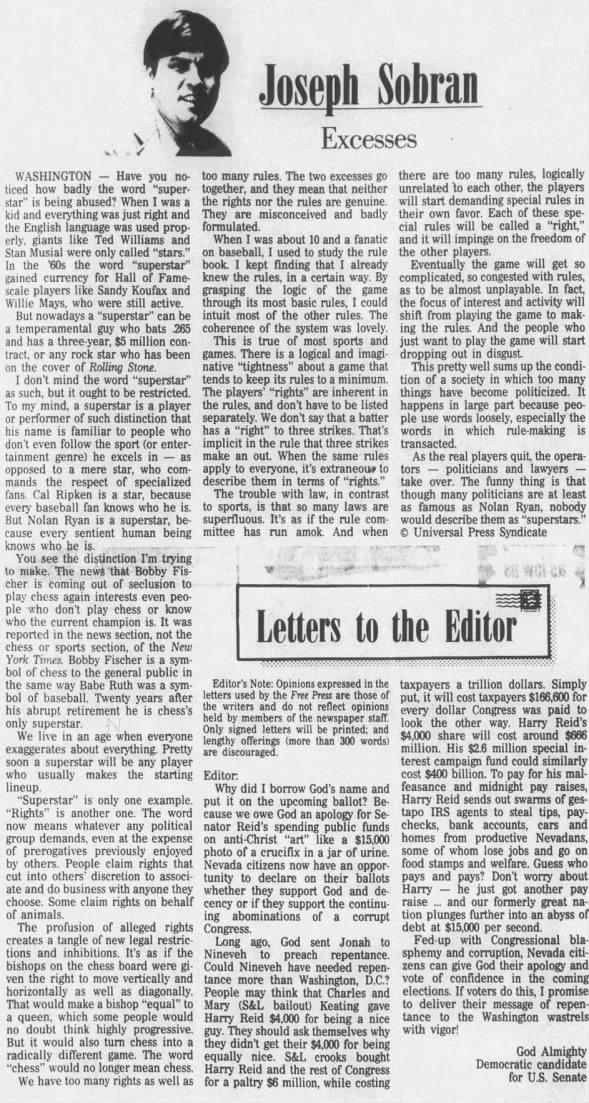 Robert Fischer, Legendary Chess Icon 07 Aug 1992, Fri Elko Daily Free Press (Elko, Nevada) Newspapers.com
Robert Fischer, Legendary Chess Icon 07 Aug 1992, Fri Elko Daily Free Press (Elko, Nevada) Newspapers.com
Daily News New York, New York Friday, August 07, 1992 - Page 428
Chess Masters Square Off
Bobby Fischer has come out of seclusion to meet Russian chess grand master Boris Spassky in a $5 million match in Yugoslavia.
The former world champions met Wednesday for an informal dinner in Belgrade and match organizers said they “made a couple of moves” at the table.
Fischer, 49, took the world title from Spassky, 55, in 1972 but forfeited the championship by refusing to defend it. He has not played in public since.
Violates Sanctions
The rematch, which might violate United Nations sanctions against Yugoslavia, was organized by Jezdimir Vasiljevic, who owns one of Yugoslavia's largest private banks. He has offered $3.35 million to the winner and $1.65 million to the loser.
The nine-game match is to begin Sept. 2 in Sveti Stefan on Montenegro's Adriatic coast and will later move to the Yugoslav and Serbian capital, Belgrade. Montenegro and Serbia are the only remaining republics in Yugoslavia. The UN imposed strict sanctions on Yugoslavia to punish the Serb-dominated federation for fomenting war in neighboring Bosnia-Herzegovina.
Training Regimen
The U.S. has strictly observed the sanctions, which prohibit commercial and sports links with Yugoslavia.
Fischer, who refused to speak to reporters, has been training for the match by analyzing chess games, lifting weights, swimming and jogging.
At 15, the Erasmus Hall High School dropout became the youngest grand master in history.
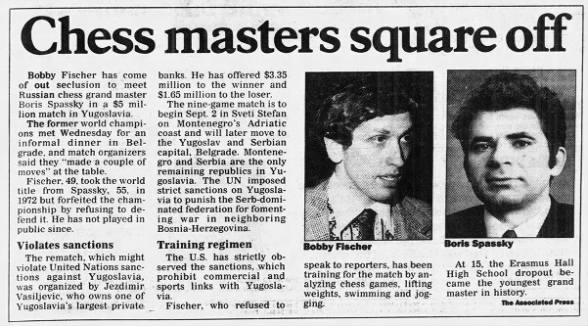 Chess Masters Square Off 07 Aug 1992, Fri Daily News (New York, New York) Newspapers.com
Chess Masters Square Off 07 Aug 1992, Fri Daily News (New York, New York) Newspapers.com
The Province Vancouver, British Columbia, Canada Friday, August 07, 1992 - Page 8
Chess Greats Play For $5M Rematch
(UPI)—In an opening move for a $5-million rematch, arch-rival chess champs Bobby Fischer and Boris Spassky met in a Belgrade restaurant for their first game in 20 years, Tanjug news agency reported yesterday.
Fischer, former world champion and an American, pulled out a pocket-size chess board and arranged the pieces right after greeting the Russian Spassky on Wednesday night, Tanjug said.
They began by analyzing their last match, which was played in Reykjavik, Iceland, in 1972.
Tanjug did not say who won.
The two came to Belgrade after agreeing to play a $5-million-US rematch of their Reykjavik encounter organized by Jezdimir Vasiljevic, the owner of Jugoskandik, a private Serbian bank.
The match is to begin Sept. 2 in Montenegro's Adriatic resort of Sveti Stefan. The winner will get $3.5 million; the loser will get the rest of the prize money.
It was still unknown whether the match would violate a United Nations ban on financial transactions with Serbia and Montenegro, which underwrote the Serbian offensive in the former Yugoslav republic of Bosnia-Herzegovina.
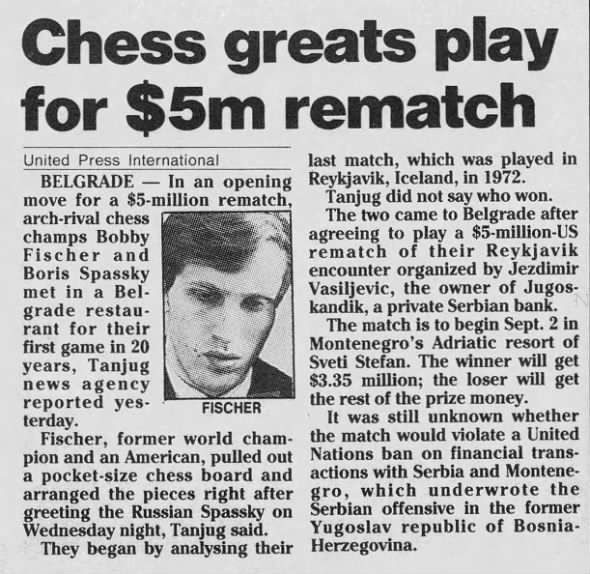 Chess Greats Play For $5M Rematch 07 Aug 1992, Fri The Province (Vancouver, British Columbia, Canada) Newspapers.com
Chess Greats Play For $5M Rematch 07 Aug 1992, Fri The Province (Vancouver, British Columbia, Canada) Newspapers.com
New York Times, New York, New York, Wednesday, September 09, 1992 - Page 20
Church Disowns Fischer
To the Editor:
Some may have incorrectly inferred from “Fischer and Spassky Ready to Play Chess Not Far From a War” (front page, Aug. 31) that Bobby Fischer is still associated with the Worldwide Church of God. Mr. Fischer's comments in no way reflect the beliefs or teachings of the church, and the church objects to any possible association with antisemitism. The Worldwide Church of God condemns racism in any and all forms.
The Worldwide Church of God has for more than a quarter-century supported the International Cultural Center for Youth in Jerusalem, where Israeli, Arab and Christian children learn more about one another, thus reducing conflict. In cooperation with Hebrew University, the church also supported archaeological work surrounding the Temple Mount in Jerusalem.
DAVID HULME
Director of Communications
and Public Affairs
Worldwide Church of God
Pasadena, Calif., Sept. 2, 1992
The Boston Globe, Boston, Massachusetts, Tuesday, September 01, 1992 - Page 2
Fischer Faces Off Against Chess Foe, World Opinion
Sveti Stefan, Yugoslavia — Bobby Fischer, the enigmatic genius of international chess, will venture out of his walled, ocean compound tomorrow to open a match whose end-game, he now predicts, will force him to seek asylum in Eastern Europe to escape prosecution in the United States.
Sponsors said Sunday that it was not easy to persuade the reclusive Fischer to turn his back on world opinion and violate a United Nations embargo against trade with Yugoslavia.
It took a dozen handmade shirts — copies of the one worn 20 years ago when he became the only American to win the world chess crown — and an agreement to raise the tournament-hall toilet seat by an inch. Since then, demands have been raised about everything from the lighting to the height of Fischer's seat.
All this, of course, plus a winner's purse said to be in excess of $5 million, according to sponsors of a sporting event billed as “The Revenge Match of the Century.”
This rematch featuring Fischer and Boris Spassky, who held the world chess title before emigrating from the Soviet Union to France, is a grand clash of personal ambition and international gamesmanship set amid much conflict.
Take the location.
The series opens tomorrow in this exclusive resort on the coast of Montenegro, the tiny republic that is the only ally of the Serbian dominated government of Yugoslavia in its conflict with the now-independent Bosnia. The first player to win 10 games wins the series.
Fischer has sought to maintain his reclusive lifestyle while preparing for the match and has hidden out behind the resort's walls, aided in his pursuit of solitude of 200 aides and security personnel hired by match sponsors.
“Even Tito didn't have that many guards with him,”said a Montenegro resident.
But Fischer's contemplative life has been shattered by the US Treasury Department, which has phoned, faxed and even sent a middleman from Congress to inform Fischer that he risks a $250,000 fine and/or 10 years in prison if he goes ahead with the match in violation of trade sanctions the UN imposed in May.
After deciding to end two decades spent in self-imposed seclusion with a religious sect in California, Fischer, 49, confided to sponsors that, after the match, he may seek asylum in Yugoslavia or perhaps in Hungary.
“Maybe I will never return home again,” is what Jezdimir Vasiljevic, the millionaire financier and sponsor of the event, recalled Fischer saying in a recent conversation.
The Times Shreveport, Louisiana Thursday, September 10, 1992 - Page 8
Bobby Fischer Trails 2-1, Spassky Makes Most of Opponent's Errors
Sveti Stefan, Yugoslavia (AP) — Bobby Fischer on Wednesday lost the second consecutive game of his comeback chess series with Boris Spassky, who took a 2-1 lead in their $5 million match.
Fischer resigned five hours into the game, after Spassky's 45th move. Holding the advantage in the middle of the game, Fischer made some mistakes that allowed Spassky to take the offensive.
“I made a couple of oversights and missed a couple of things,” he said, referring to Spassky's 25th move, which broke the pattern of Fischer's attack by forcing an exchange of bishops.
The loss sets up another possible comeback scenario for Fischer, 49, who returned to chess competition after 20 years in virtual seclusion. In their 1972 match, Fischer was behind 2-0, but came back to defeat Spassky to become America's first and only world chess champion.
The first player to score 10 victories wins the match. The next game is today.
The defeat was all the more galling for Fischer because he was playing white, which theoretically gave him an advantage because he got the first move.
“When you're losing with white, you know there's something wrong,” said Yugoslav grandmaster Stefan Djuric.
Fischer, who still claims to be world champion and has demanded the rematch be considered a world championship event, used the Ruy Lopez, or Spanish opening.
He used the same opening in his victory in the first game of the series on Sept. 2. The first 15 moves today were identical to that game.
“Essentially, Bobby became a victim in a very unnatural way,” said American grandmaster Yasser Seirawan after the game. “He played strong, logical moves and ended up in bad position. He was playing very clear, good moves, but his opponent played better.”
Only about 20 spectators and a much-reduced press corps watched Tuesday's game. The winner of the series will get $3.35 million, and the loser received $1.65 million.
Chess experts have speculated the match could stretch into weeks or even months. The second and third games were draws and did not count in the scoring. Spassky, a Russian-born French citizen, won his first game on Sunday.
The contest is being played in defiance of international sanctions against Yugoslavia, now comprising only of Serbia and Montenegro, for its role in the war in neighboring Bosnia-Herzegovina.
New York Times, New York, New York, Saturday, November 14, 1992 - Page 27
Prof. Arpad E. Elo Is Dead at 89; Inventor of Chess Ratings System
Prof. Arpad E. Elo, a physicist and astronomer who devised the system that ranks the world's chess players, and a founder of the United States Chess Federation, died on Nov. 5 at his home in Milwaukee. He was 89 years old.
The Milwaukee Journal said the cause of death was a heart attack.
Professor Elo introduced his ratings system in the United States about 1950. It has since been adopted not only by the World Chess Federation but by sports organizations as well. It is used, for example, to rank table-tennis players.
Under the Elo system for chess, four-digit ratings are used to measure each player's relative strength. The ratings are based on results in tournament and match play weighted according to opponents' strength.
“It is a measuring tool, not a device of reward or punishment,” Professor Elo once commented. “It is a means to compare performances, assess relative strength, not a carrot waved before a rabbit, or a piece of candy given to a child for good behavior.”
At the Top of the List
Mr. Fischer last week ended a 20-year absence from competitive chess to win an exhibition match against Boris Spassky, another former champion. Mr. Fischer had a rating of 2780 when he gave up chess in 1972; since then he has kept the rating, but the federation has listed him as inactive. The federation has not indicated whether it will rate his performance in the match just completed.
Once Professor Elo's system was accepted, he devoted a considerable effort to working with the world federation to assure its statistical accuracy and integrity.
Arpad Emrick Elo, who was born in Hungary, served from 1935 to 1937 as administrator of the American Chess Federation, which merged with the National Chess Federation in 1939 to become the United States Chess Federation.
He created a chess program for the children of his adopted city, Milwaukee, that was endorsed by the merged federation and served as the model for children's programs in dozens of other cities across the country.
Left Competition
In the 1940's, Professor Elo held his own against some of the best players in over-the-board play. He faced the young Mr. Fischer in 1957, but then left competitive play to others and gave more time to his academic career.
He was a professor of physics and astronomy in the physics department of Marquette University in Milwaukee from 1935 to 1965. After retiring from Marquette, he lectured for several years at the University of Wisconsin.
Aside from chess, he liked gardening, beekeeping, winemaking and grinding his own telescope lenses for stargazing.
Professor Elo's wife, Henriette, died three years ago. He is survived by his son, Arpad E. Jr. of St. Johnsbury, Vt., and a sister, Bertha Papp of Alrington Heights, Ill.
New York Times, New York, New York, Wednesday, December 16, 1992 - Page 3
Fischer Is Indicted Over Chess Match
Games With Spassky Violated Embargo on Yugoslavia Government Charges
By Stephan Labaton
WASHINGTON, Dec. 15 — Bobby Fischer, the mercurial chess master who returned to the game professionally in September after 20 years, was indicted today on charges that he had violated economic sanctions against Yugoslavia by playing a match there.
A Federal grand jury here handed up the single-count indictment that accused Mr. Fischer of violating an executive order issued by President Bush in June that restricted commercial relations with what remains of Yugoslavia.
In the match, Mr. Fischer defeated the Russian-born grandmaster Boris Spassky in an exhibition rematch of their celebrated 1972 world championship.
Immediately after the indictment, Federal officials issued a warrant for his arrest.
Mr. Fischer, who was believed to be in the former Yugoslav federation faces the choice of living in exile or returning to the United States for a trial that could result in up to 10 years in prison and a fine as high as $250,000.
Prosecution No Surprise
Action against Mr. Fischer appeared a virtual certainty after his brooding and bitter news conference in September in Sveti Stevan, Yugoslavia, 70 miles from the killing in Bosnia and Herzegovina, a former Yugoslav Republic. He produced a Treasury Department letter ordering him not to play and warning of possible prosecution, held it up and spit at it.
The indictment came as Mr. Fischer appeared ready to resume a more active playing schedule. When he captured the championship 20 years ago, his strategic brilliance and relentless accuracy earned him the reputation as one of the greatest chess players ever. His most recent performance reflected an inconsistent, though promising foray back into the game.
Trial or Exile
Prosecutors said that since he had also violated a United Nations economic sanctions measure they would try to have him extradited if he traveled outside of the former Yugoslav federation, although experts in international law said that would be very difficult.
“Mr. Fischer faces the choice or returning to this country or being checkmated to Yugoslavia,” said Jay B. Stephens, the United States Attorney in Washington, who said that the Government could also try to seize his winnings of $3.35 million and 10 percent of the match's royalties.
International law scholars expressed surprise that, of all the possible violations of the economic embargo by arms salesmen and other commercial ventures, the Administration had chosen to go after a former chess champion.
“I'm amazed,” said Andreas F. Lowenfeld, a professor of international law at New York University who was a deputy legal adviser at the State Department in the 1960's. “With all the criminals in the world, it's hard to believe you go after Bobby Fischer. I understand you want to be serious about economic sanctions. But he would not be my prime target.”
But Mr. Stephens defended the indictment for conveying an important message about the devastation in the former Yugoslavia.
He said, “There is violence and there is ethnic cleansing. The world community has indicated that economic sanctions should be imposed and, in being imposed, should be enforced.”











